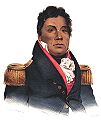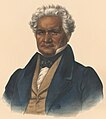User:StarmanDeMarte/sandbox

Thomas L. McKenney[edit]
Thomas Loraine McKenney (21 March 1785 – 19 February 1859) was a United States official who served as Superintendent of Indian Affairs from 1824–1830.
McKenny was born on March 21, 1785, in Hopewell, Maryland. He was the oldest of five boys, and was raised and received his education at Chestertown, Maryland. McKenney was a Quaker, which influenced his approach to interactions with Native Americans. He and his family moved to Georgetown where McKenney worked as a merchant, working at a store where he lived. McKenney later became the Superintendent of Indian Trade 1816.
Superintendent of Indian Trade/Superintendent of Indian Affairs[edit]
McKenney was the Superintendent of Indian Affairs from 1824 to 1830, he oversaw trading houses that created goods that were traded for furs. After the abolition of the U.S. Indian Trade program in 1822, then Secretary of War John C. Calhoun created a position without legislation within the War Department entitled Superintendent of Indian Affairs (this later became part of the Bureau of Indian Affairs). McKenney was appointed to this position, and held it from 1824-1830. McKenney was an advocate of the American Indian “civilization” program, becoming an avid promoter of Indian removal west of the Mississippi River. President Andrew Jackson dismissed McKenney from his position in 1830 when Jackson disagreed with his opinion that “the Indian was, in his intellectual and moral structure, our equal.”
McKenney got the position after he helped support John C. Calhoun's bid for president in 1824 McKenney was an advocate of the American Indian “civilization” program, becoming an avid promoter of Indian removal west of the Mississippi River. While being the Superintendent of Trade and Indian Affairs McKenney helped with the Indian Civilization Act of 1819 and eleven years later he also helped with the Indian Removal Act of 1930.
Despite having helped with the Indian Removal Act McKenney denounced the United States Government for failing to keep white people off of Territory belonging to the Cherokee as part of a treaty.[1] President Andrew Jackson was not pleased with the way McKenney was operating as the Superintendent of Indian Affairs. This resulted in McKenney being fired from his position as the Superintendent of Indian Affairs.
History of the Indian Tribes of North America[edit]

McKenney worked with James Hall along with Charles Bird King to create and publish the three volumes of the History of the Indian Tribes of North America, which were released from the years of (1836-1844).[2] In 1821-1822 multiple delegates of various tribes visited Washington and while they were there McKenney took them to Charles Bird King who would paint their likeness. McKenney kept this going while working at the Department of War until he was fired, he then moved to Philadelphia to better work on the project. Once in Philadelphia the portraits were copied, in the end there were around 150 portraits.
Gallery of the History of the Indian Tribes of North America[edit]
-
A-na-cam-e-gish-ca, A Chippeway (Ojibwe) chief
-
Amiskquew, A Menominee warrior
-
Caa-tou-see, An Ojibwe chief
-
Jack-O-Pa, An Ojibwe chief
-
Kee-shes-wa, A Fox chief
-
Little Crow, A Sioux chief
-
Ojibwe woman and child
-
Choctaw chief Pushmataha, 1824
-
Cherokee Major Ridge, 1834
-
Sequoyah or George Guess, creator of the Cherokee alphabet
-
Tah-Chee (Dutch), A Cherokee chief
-
Tshusick, An Ojibwe woman
Death and Legacy[edit]
After McKenny was fired he tried and failed to be appointed to the Whig administration of then president Zachary Taylor. McKenny would die in a Brooklyn boardinghouse alone with no wife or son, his family had already passed away by that point. He wrote the two volume work, History of the Indian Tribes of North America, With Biographical Sketches and Anecdotes of the Principal Chiefs.
References[edit]
- ^ "Digital History". www.digitalhistory.uh.edu. Retrieved 2021-05-07.
- ^ "Thomas McKenney and the Indians | Glover Park History". gloverparkhistory.com. Retrieved 2021-03-31.
Bibliography[edit]
- Drinnon, Richard. “Facing West.” Google Books. Google. Accessed April 20, 2021. https://books.google.com/books?id=wrexPiqKo58C&q=Thomas%2BL.%2BMcKenney#v=snippet&q=Thomas%20L.%20McKenney&f=false.
- Fletcher, Carlton. “Home.” Glover Park History. Accessed April 20, 2021. https://gloverparkhistory.com/estates-and-farms/weston/thomas-l-mckenney-and-the-indians/.
- Viola, Herman J. “Diplomats in Buckskins.” Google Books. Google. Accessed April 20, 2021. https://books.google.com/books?id=FeGEhXY-4aEC&q=KENNY#v=onepage&q=mckenney&f=false.
- Viola, Herman J. “McKenney, Thomas Loraine (1785-1859), Government Official.” American National Biography. Oxford University Press. Accessed April 20, 2021. https://www.anb.org/view/10.1093/anb/9780198606697.001.0001/anb-9780198606697-e-0300320;jsessionid=7986B9412E2F498488536AE7EC415489.
- McKenney, Thomas L. Digital History. Accessed May 7, 2021. https://www.digitalhistory.uh.edu/disp_textbook.cfm?smtid=3&psid=679.















